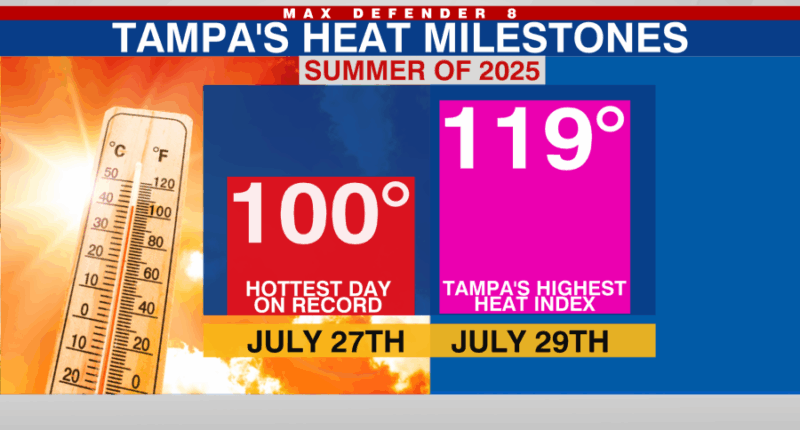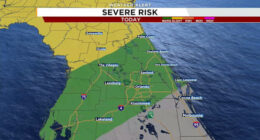Share this @internewscast.com
Jeff Berardelli is WFLA’s Chief Meteorologist and Climate Specialist. For the latest updates on Tampa Bay weather and climate, follow him on X and Bluesky.
TAMPA, Fla. (WFLA) — Meteorological summer — encompassing June, July, and August — has concluded, leaving behind quite a memorable season. Tampa experienced its first 100-degree day and recorded its highest heat index at a scorching 119.
Despite these extreme temperatures, it wasn’t the hottest summer on record. Statistically, Tampa had its third hottest summer since records began in 1890, with official data collected at the airport.
The year 2023 holds the record for the hottest summer, while 2024 was noted as the most oppressive in terms of heat and humidity. These record-breaking years underscore the undeniable impact of climate change. Now, let’s delve into the specifics.
A significant milestone, albeit an unwelcome one, was when Tampa hit 100 degrees for the first time on July 27, setting a new all-time high for the city. Just two days later, the heat index soared to a record-breaking 119.

Another noteworthy aspect was the stifling morning temperatures. Tampa experienced 29 mornings where temperatures never dipped below 80 degrees, marking the third most times this has occurred, only surpassed by 2022 and 2023.

Mornings are actually warming faster than daytime all around the globe due to climate change. That’s because excess greenhouse gases (from the burning of fossil fuels) and extra water vapor act as a blanket at night, cutting Earth’s radiative heat loss.
Add to that near record Gulf temperatures for the last few years and any morning with an onshore flow stays unusually warm.
And don’t forget about urbanization. There’s a lot more concrete and asphalt now so cities like Tampa store more heat at night, whereas rural areas radiate and cool better.
On the whole, Tampa had its third hottest summer. Plant City had its fourth hottest summer, Brooksville sixth, Winter Haven seventh, and Venice ninth. All cities were about 1-2 degrees Fahrenheit above the recent 30 year normal.

Over the longer-term, warmer summers have become a lot more common due to climate change — both from urban heating and excess greenhouse gases. Since 1970, Tampa summers are now 2.6 degrees Fahrenheit warmer.

It’s not just Tampa. In fact, the vast majority of the U.S. is warming — most places faster than Tampa. The U.S. West has warmed 4-5 degrees during summer since 1970.

In terms of rain, summer 2025 was a mixed bag. It was wet to the south of Tampa Bay and dry to the north and east. Winter Haven had its fourth driest summer on record, but Sarasota had 9 inches above normal rainfall.

Regardless of how much rain fell, it was enough to wipe out most drought from the Tampa Bay Area — for now.














